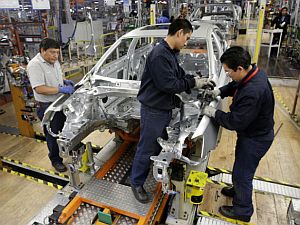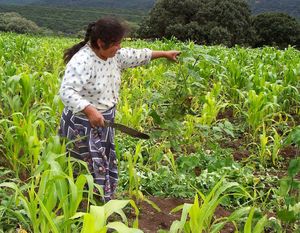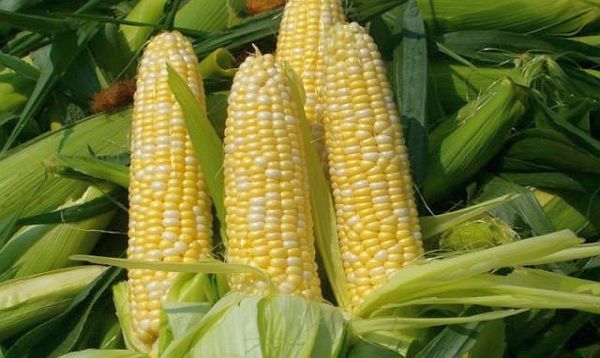Among other threats targeting Mexico during his election campaign, US President Donald Trump harshly criticized the North American Free Trade Agreement (NAFTA), a 23-year-old tripartite deal that removed tariffs and significantly increased commerce between Canada, the United States and Mexico.
Renegotiation of the deal is likely to start late this year.
As Trump has pointed out, NAFTA contributed to a US trade deficit with Mexico reaching US$63.2 billion last year.
 |
But that's only part of the story. Remove cars and auto part imports, for example, and the US deficit with Mexico virtually disappears.
Overall, NAFTA has been beneficial to Mexico, Canada and the US alike. Since it was signed in 1994, foreign direct investments (FDI) in Mexico have averaged 2.6% of GDP (compared to 1% for two decades before NAFTA). At present, annual bilateral trade between the US and Mexico is running at US$580 billion.
Agricultural gains
Much of Trump's outdated protectionist rhetoric hinges on manufacturing, outsourcing of jobs to Mexico and immigration. Agriculture - a key link between the two nations - does not seem to have entered his calculations.
 |
For the 2014–15 crop marketing year, US corn production was 360 million metric tons, 13% of which was exported. Mexico accounted for 23% of these exports.
In 2016, Mexico imported US$17.9 billion in American agricultural products: US$2.6 billion in corn, US$1.5 billion in soybeans, US$1.3 billion in pork and US$1.2 billion in dairy products.
Around 98% of the corn that forms a staple of the Mexican diet comes from the US. Mexico also buys 7.8% of all US pork production.
What has been good for US farmers has actually hurt Mexican agriculture. Lulled by a steady supply of cheap US farm products and low transportation costs, and assuming that the good times will continue, Mexico has not diversified its agricultural imports. It depends heavily on US farmers to feed its people, endangering Mexico's long-term food security.
America losing ground
 |
As these rivals have adopted more modern farming and agricultural practices and improved their transport and product-handling infrastructure in recent years, America's global export share has been steadily declining.
Political decisions have at times accelerated this decline. In 1979, the US banned grain sales to the then-Soviet Union because of its invasion of Afghanistan. This forced the USSR to improve its own grain production, and, in 2016, Russia surpassed the US for the first time in wheat exports. Might Donald Trump's administration be facing a similar watershed moment for American agriculture?
As America threatens to close its agricultural export door, it has damaged Mexico's confidence in the reliability of its major supplier - perhaps permanently. In a January 2017 Washington Post opinion piece, former Mexican president Ernesto Zedillo wrote that it was a "waste of time" to play "NAFTA tweaking games with the Trump Administration."
Though Mexico currently has free trade agreements with 45 countries (more than any other country in the world), agriculture has consistently been the most sensitive issue in Mexico's free trade agreements. Trump has changed that.
 |
Mexico's Deputy Economy Minister Juan Carlos Baker has said that the country is "pretty far advanced with Brazil. Argentina is a few steps behind," confirming that Mexico could offer South American producers terms similar to those currently enjoyed by American farmers "if it suits us."
And Brazil's Agriculture Minister Blairo Maggi has announced that the country is "back in the game."
Mexico is also discussing bilateral deals with Australia and New Zealand, two other main food-exporting countries.
 |
The New York-traded Buenos Aires-based firm, whose major shareholders include the Hungarian-American investor George Soros, the Dutch Pension Fund PGGM and the Qatar Investment Authority, currently exports agricultural products such as corn, wheat, soybean and cotton to Africa, Asia and Middle East.
It sees NAFTA-related uncertainties as an opportunity to penetrate the Mexican market, especially if Brazilian and Argentinian products are granted the more favorable US-style export arrangements.
Mexico's brighter outlook
 |
New policies currently under consideration would incentivise farmers to produce more, modernize their farms, increase crop yields, and expand cultivable areas. The country is also looking to improve its transportation and storage infrastructure, including ports that could be used for bulk grain imports.
All of these efforts will help put Mexico on more equal footing with the United States in future NAFTA negotiations. So, too, would retaliatory measures against a threatened US border tax. (And, anyway, if the US does decide to implement one, the market is likely to sell off Mexican peso aggressively, making Mexican products cheaper even with new tariffs.)
Like the 1979 US grain ban that helped Russia improve its agriculture, Trump's vituperation may prove beneficial to Mexico (and bad for the US) in the decades to come.
In the meantime, Mexico is facing a tough political and social landscape. President Enrique Peña Nieto's approval rating is nearing single digits and the economy is performing anemically, with 2017 economic growth predicted to be a paltry 1%.
With a presidential election approaching in 2018, Peña Nieto is unlikely to hard sell to his people a new NAFTA that does not appeal to Mexicans. So it would be good politics, too, to play hardball with Trump.
Mexico has more policy options than it thinks. And it may have less to lose than its northern neighbor.
If ending NAFTA hurts farmers in America's Corn Belt, who voted overwhelmingly for Trump, there goes the Republican's reelection.
Original article written by Cecilia Tortajada, Senior Research Fellow, Lee Kuan Yew School of Public Policy, National University of Singapore, for The Conversation.


